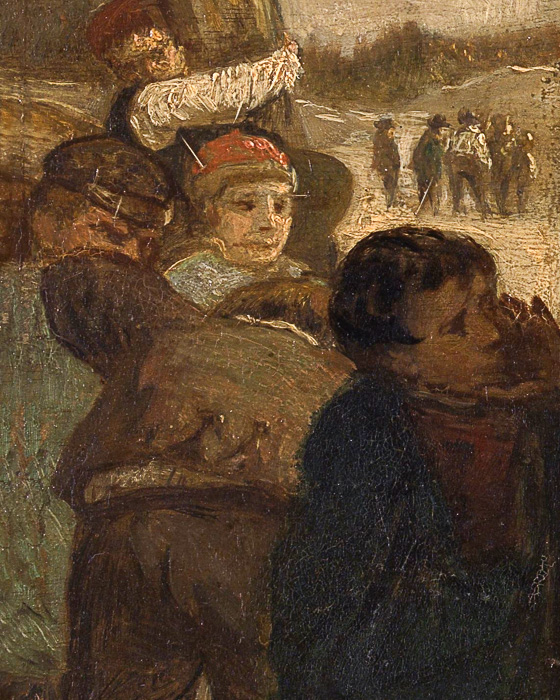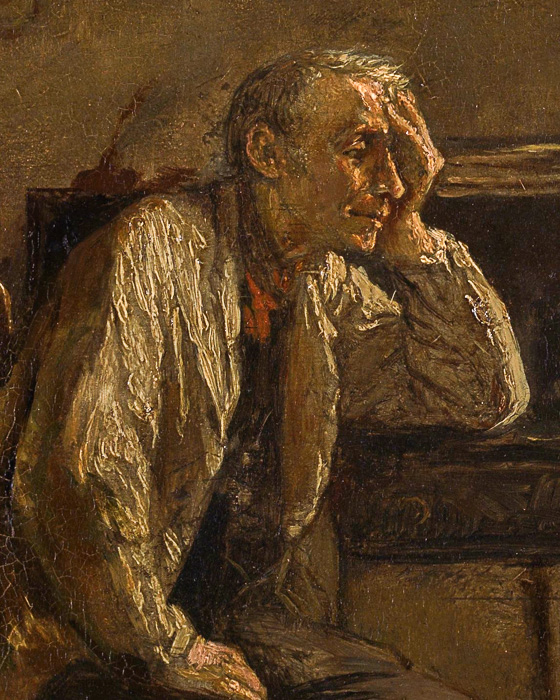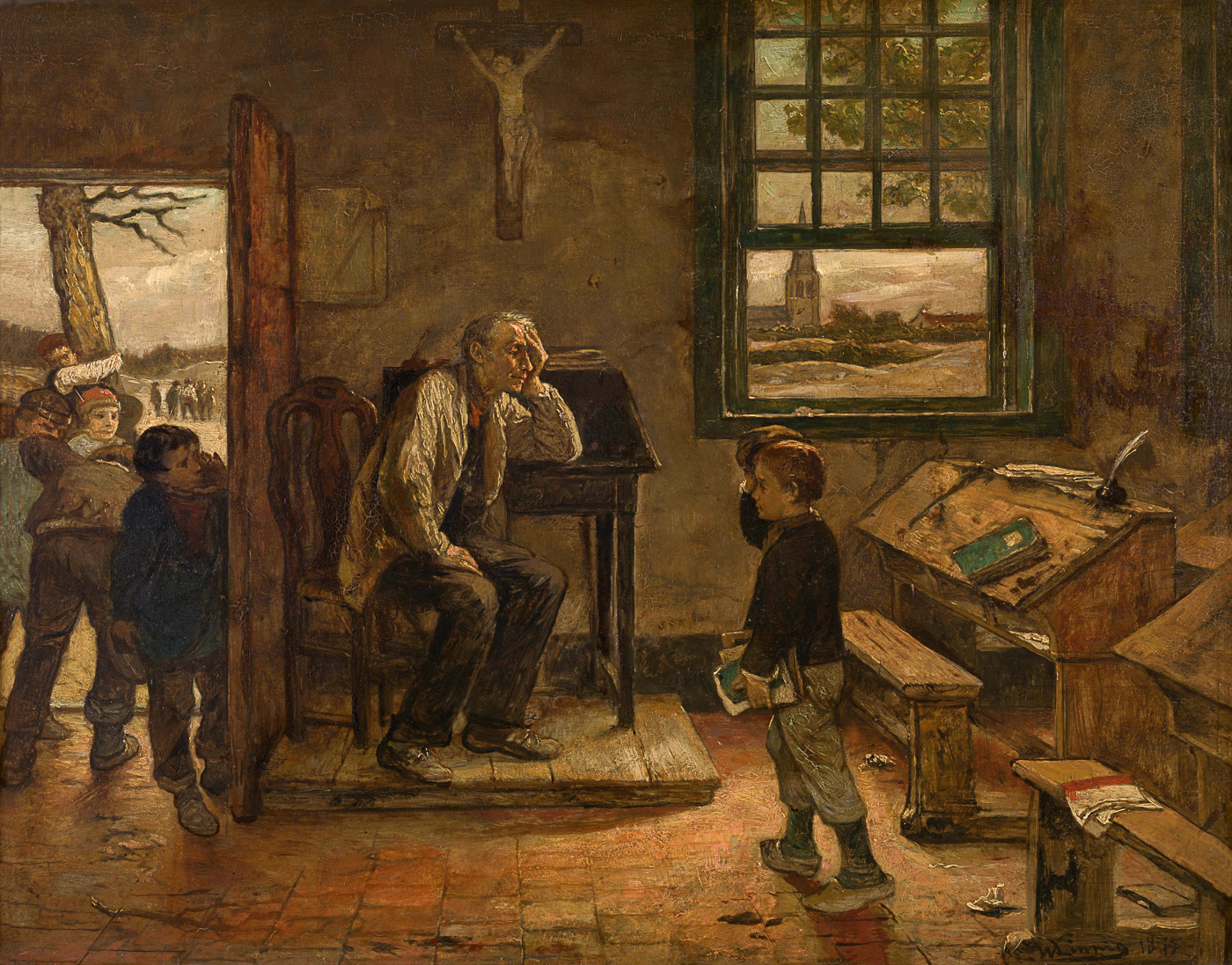—Ink and Echoes—
Eternal Education
vs.
Fashionable Fallacies

from What's Wrong With the World
G.K. Chesteron
—1910—
The fashionable fallacy is that by education we can give people something that we have not got. To hear people talk one would think it was some sort of magic chemistry, by which, out of a laborious hotchpotch of hygienic meals, baths, breathing exercises, fresh air and freehand drawing, we can produce something splendid by accident; we can create what we cannot conceive. These pages have, of course, no other general purpose than to point out that we cannot create anything good until we have conceived it. It is odd that these people, who in the matter of heredity are so sullenly attached to law, in the matter of environment seem almost to believe in miracle. They insist that nothing but what was in the bodies of the parents can go to make the bodies of the children. But they seem somehow to think that things can get into the heads of the children which were not in the heads of the parents, or, indeed, anywhere else.
There has arisen in this connection a foolish and wicked cry typical of the confusion. I mean the cry, “Save the children.” It is, of course, part of that modern morbidity that insists on treating the State (which is the home of man) as a sort of desperate expedient in time of panic. This terrified opportunism is also the origin of the Socialist and other schemes. Just as they would collect and share all the food as men do in a famine, so they would divide the children from their fathers, as men do in a shipwreck. That a human community might conceivably not be in a condition of famine or shipwreck never seems to cross their minds.  This cry of “Save the children” has in it the hateful implication that it is impossible to save the fathers; in other words, that many millions of grown-up, sane, responsible and self-supporting Europeans are to be treated as dirt or debris and swept away out of the discussion; called dipsomaniacs because they drink in public houses instead of private houses; called unemployables because nobody knows how to get them work; called dullards if they still adhere to conventions, and called loafers if they still love liberty. Now I am concerned, first and last, to maintain that unless you can save the fathers, you cannot save the children; that at present we cannot save others, for we cannot save ourselves. We cannot teach citizenship if we are not citizens; we cannot free others if we have forgotten the appetite of freedom. Education is only truth in a state of transmission; and how can we pass on truth if it has never come into our hand? Thus we find that education is of all the cases the clearest for our general purpose. It is vain to save children; for they cannot remain children. By hypothesis we are teaching them to be men; and how can it be so simple to teach an ideal manhood to others if it is so vain and hopeless to find one for ourselves?
This cry of “Save the children” has in it the hateful implication that it is impossible to save the fathers; in other words, that many millions of grown-up, sane, responsible and self-supporting Europeans are to be treated as dirt or debris and swept away out of the discussion; called dipsomaniacs because they drink in public houses instead of private houses; called unemployables because nobody knows how to get them work; called dullards if they still adhere to conventions, and called loafers if they still love liberty. Now I am concerned, first and last, to maintain that unless you can save the fathers, you cannot save the children; that at present we cannot save others, for we cannot save ourselves. We cannot teach citizenship if we are not citizens; we cannot free others if we have forgotten the appetite of freedom. Education is only truth in a state of transmission; and how can we pass on truth if it has never come into our hand? Thus we find that education is of all the cases the clearest for our general purpose. It is vain to save children; for they cannot remain children. By hypothesis we are teaching them to be men; and how can it be so simple to teach an ideal manhood to others if it is so vain and hopeless to find one for ourselves?

Education is only truth in a state of transmission; and how can we pass on truth if it has never come into our hand?

I know that certain crazy pedants have attempted to counter this difficulty by maintaining that education is not instruction at all, does not teach by authority at all. They present the process as coming, not from the outside, from the teacher, but entirely from inside the boy. Education, they say, is the Latin for leading out or drawing out the dormant faculties of each person. Somewhere far down in the dim boyish soul is a primordial yearning to learn Greek accents or to wear clean collars; and the schoolmaster only gently and tenderly liberates this imprisoned purpose. Sealed up in the newborn babe are the intrinsic secrets of how to eat asparagus and what was the date of Bannockburn. The educator only draws out the child’s own unapparent love of long division; only leads out the child’s slightly veiled preference for milk pudding to tarts. I am not sure that I believe in the derivation; I have heard the disgraceful suggestion that “educator,” if applied to a Roman schoolmaster, did not mean leading our young functions into freedom; but only meant taking out little boys for a walk. But I am much more certain that I do not agree with the doctrine; I think it would be about as sane to say that the baby’s milk comes from the baby as to say that the baby’s educational merits do. There is, indeed, in each living creature a collection of forces and functions; but education means producing these in particular shapes and training them to particular purposes, or it means nothing at all. Speaking is the most practical instance of the whole situation. You may indeed “draw out” squeals and grunts from the child by simply poking him and pulling him about, a pleasant but cruel pastime to which many psychologists are addicted. But you will wait and watch very patiently indeed before you draw the English language out of him. That you have got to put into him; and there is an end of the matter.
But the important point here is only that you cannot anyhow get rid of authority in education; it is not so much (as poor Conservatives say) that parental authority ought to be preserved, as that it cannot be destroyed. Mr. Bernard Shaw once said that he hated the idea of forming a child’s mind. In that case Mr. Bernard Shaw had better hang himself; for he hates something inseparable from human life. I only mentioned educere and the drawing out of the faculties in order to point out that even this mental trick does not avoid the inevitable idea of parental or scholastic authority. The educator drawing out is just as arbitrary and coercive as the instructor pouring in; for he draws out what he chooses. He decides what in the child shall be developed and what shall not be developed. He does not (I suppose) draw out the neglected faculty of forgery. He does not (so far at least) lead out, with timid steps, a shy talent for torture. The only result of all this pompous and precise distinction between the educator and the instructor is that the instructor pokes where he likes and the educator pulls where he likes. Exactly the same intellectual violence is done to the creature who is poked and pulled. Now we must all accept the responsibility of this intellectual violence. Education is violent; because it is creative. It is creative because it is human. It is as reckless as playing on the fiddle; as dogmatic as drawing a picture; as brutal as building a house. In short, it is what all human action is; it is an interference with life and growth. After that it is a trifling and even a jocular question whether we say of this tremendous tormentor, the artist Man, that he puts things into us like an apothecary, or draws things out of us, like a dentist.
 The point is that Man does what he likes. He claims the right to take his mother Nature under his control; he claims the right to make his child the Superman, in his image. Once flinch from this creative authority of man, and the whole courageous raid which we call civilization wavers and falls to pieces. Now most modern freedom is at root fear. It is not so much that we are too bold to endure rules; it is rather that we are too timid to endure responsibilities. And Mr. Shaw and such people are especially shrinking from that awful and ancestral responsibility to which our fathers committed us when they took the wild step of becoming men. I mean the responsibility of affirming the truth of our human tradition and handing it on with a voice of authority, an unshaken voice. That is the one eternal education; to be sure enough that something is true that you dare to tell it to a child.
The point is that Man does what he likes. He claims the right to take his mother Nature under his control; he claims the right to make his child the Superman, in his image. Once flinch from this creative authority of man, and the whole courageous raid which we call civilization wavers and falls to pieces. Now most modern freedom is at root fear. It is not so much that we are too bold to endure rules; it is rather that we are too timid to endure responsibilities. And Mr. Shaw and such people are especially shrinking from that awful and ancestral responsibility to which our fathers committed us when they took the wild step of becoming men. I mean the responsibility of affirming the truth of our human tradition and handing it on with a voice of authority, an unshaken voice. That is the one eternal education; to be sure enough that something is true that you dare to tell it to a child.

That is the one eternal education; to be sure enough that something is true that you dare to tell it to a child.

From this high audacious duty the moderns are fleeing on every side; and the only excuse for them is, (of course,) that their modern philosophies are so half-baked and hypothetical that they cannot convince themselves enough to convince even a newborn babe. This, of course, is connected with the decay of democracy; and is somewhat of a separate subject. Suffice it to say here that when I say that we should instruct our children, I mean that we should do it, not that Mr. Sully or Professor Earl Barnes should do it. The trouble in too many of our modern schools is that the State, being controlled so specially by the few, allows cranks and experiments to go straight to the schoolroom when they have never passed through the Parliament, the public house, the private house, the church, or the marketplace. Obviously, it ought to be the oldest things that are taught to the youngest people; the assured and experienced truths that are put first to the baby. But in a school to-day the baby has to submit to a system that is younger than himself. The flopping infant of four actually has more experience, and has weathered the world longer, than the dogma to which he is made to submit. Many a school boasts of having the last ideas in education, when it has not even the first idea; for the first idea is that even innocence, divine as it is, may learn something from experience. But this, as I say, is all due to the mere fact that we are managed by a little oligarchy; my system presupposes that men who govern themselves will govern their children. To-day we all use Popular Education as meaning education of the people. I wish I could use it as meaning education by the people.

